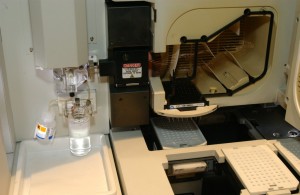What is prenatal paternity test?
A non-invasive prenatal paternity test provides reliable results without the need for gynecological surgery. It’s as simple as sending the mother’s blood samples (from the 9th week of pregnancy) and a DNA-sample of the alleged father. This test is safe for mother and child and the results confirm paternity with a probability of more than 99.9%.
The performed analysis is focused on the free fetal DNA (not cellular). Fetal DNA fragments and free maternal DNA are found in the blood of the mother, even in the first weeks of pregnancy.
The free fetal DNA is isolated, amplified, and consequently the the similarities between the genetic markers of the child and the alleged father’s DNA are compared.
No risk for the continuation of your pregnancy.
Until recently, prenatal paternity tests required the chorionic villus sampling or amniotic fluid by amniocentesis, both invasive techniques involving risks for both the mother and the fetus. Amniocentesis carries a risk of miscarriage between 1/300 to 1/500, the chorionic villus sampling entails a similar risk of miscarriage and a risk of damage 1/3000 of a member of the fetus, especially when performed before the 10th week of pregnancy.
A non-invasive prenatal paternity test based on the analysis of free DNA carries no risk of miscarriage for the mother or the child since it requires only a blood test that can be performed by a nurse or any laboratory.
When can you do a paternity test while pregnant?
The test is possible from the 11th week of gestation (from the first day of last menstrual period). This is equivalent to the 9th week of pregnancy as of the date of fertilization.
It is not advised to carry out a prenatal paternity test before the 9th week of pregnancy, since there is not enough fetal cells in the maternal blood. If not enough fetal cells are found in the blood-sample, you will be required to send a new one to the laboratory, so you will be wasting a lot of time.
Not a lot of laboratories are currently accredited to perform the prenatal paternity test, but you will find many re-sellers of this test on the internet.
You can order this test earlier and the sampling kit will be sent by mail, but you shouldn’t perform the blood test before the 11th week of gestation (9th week of pregnancy) for the results to be conclusive.
Methodology and accuracy of the results:
It’s been a number of years since fetal free DNA is known. However, only recently modern techniques of single nucleotide polymorphisms analysis (SNP arrays) and advances in computer technology have allowed genetic marker (SNPs 2,688) analysis, wihich are considered conclusive for paternal testing.
A prenatal paternity test calculates the similarity between 2,688 SNP markers of fetal DNA and DNA of the alleged father(s). The paternity test can also be carried out with unrelated men or brothers/sisters of the unborn child.
Paternity is confirmed with a probability greater than 99.9% when enough similarities between the child’s DNA markers and it’s alleged father are found.
Fatherhood is excluded where there is no sufficient number of similarities between the samples.
Prenatal paternity test can provide very accurate results at a time when uncertainty about the child’s paternity could be reason enough to want to terminate a pregnancy. The test’s accuracy is achieved thanks the involvement of a large number of markers and the fact that it concerns the fetal free DNA and not the cellular DNA. Fetal cell DNA traces may persist in maternal blood for years after a pregnancy, which is not the case of the free fetal DNA. Paternity test from fetal free DNA therefore do not have a risk of error due to the persistence of fetal cells from a previous pregnancy.
Please note that a prenatal paternity test can not be performed when the pregnancy concerns twins (if you are expecting twins).
The results are usually available in 8-10 business days from the receipt of blood samples by the laboratory.
This delay may seem long, but please realize that this test involves a considerable technical process and it usually takes one month before receiving the results of an amniocentesis.
How much does a paternity test while pregnant cost?
Prenatal paternity testing on pregnant women from the 9th week of pregnancy is complex and expensive (prices are currently found between $1100 and $1300). The high price of this test can be explained:
– the complexity of the necessary laboratory work to isolate and amplify the fetal DNA before it can make the comparison of DNA markers with those of her parents, only a few laboratories are currently accredited to perform this test in the United States.
– the price gap between $1100 and $1300 is not due to the quality of analysis but to the fact that there are a multitude of distributors of this test on the internet, which apply a margin or administrative costs of processing to the price of the test.
– This test is the most expensive DNA test at this time. We hope the technical progress in DNA analysis equipment allow laboratories to lower prices over the coming years.
– If doubt is not substantial and you wait to do this DNA test when the child is born, note that the paternity test done with buccal sample from the father and the child are significantly cheaper (around $170).
Price includes shipping to your home of a test-kit and DNA analysis by the laboratory. You will be responsible for fresh blood samples (Can be taken by any qualified nurse or lab) and the postage of sending these samples to the laboratory.
Practical information for a prenatal paternity test:
1. The laboratory will recalculate the number of weeks of pregnancy with you to determine the possible date of blood collection. You specify if you prefer to make the journey to the laboratory or that you will have a blood-sample taken by another lab or nurse and will send the samples by post. You’ll be required to make a deposit corresponding to half the price of the test, the balance being due only upon return to the lab tubes containing samples.
2. The laboratory will send the sample kit for mother and alleged father, upon receipt of a down payment on the price of the test. If you want to involve an additional father make this known to the laboratory as soon as possible.
3. Blood tests should be performed by qualified medical personnel, using the kit sent by the laboratory so that the fetal DNA or the parent is not degraded by the use of inappropriate reagents. The samples are returned to the laboratory. It is best to use a reinforced envelope (bubble type) and fast delivery by mail or courier.
4. The laboratory test starts on receipt of all samples and full payment of the test. Results are sent via email to the person who ordered the test in 8-10 working days of receiving blood samples by the laboratory.

